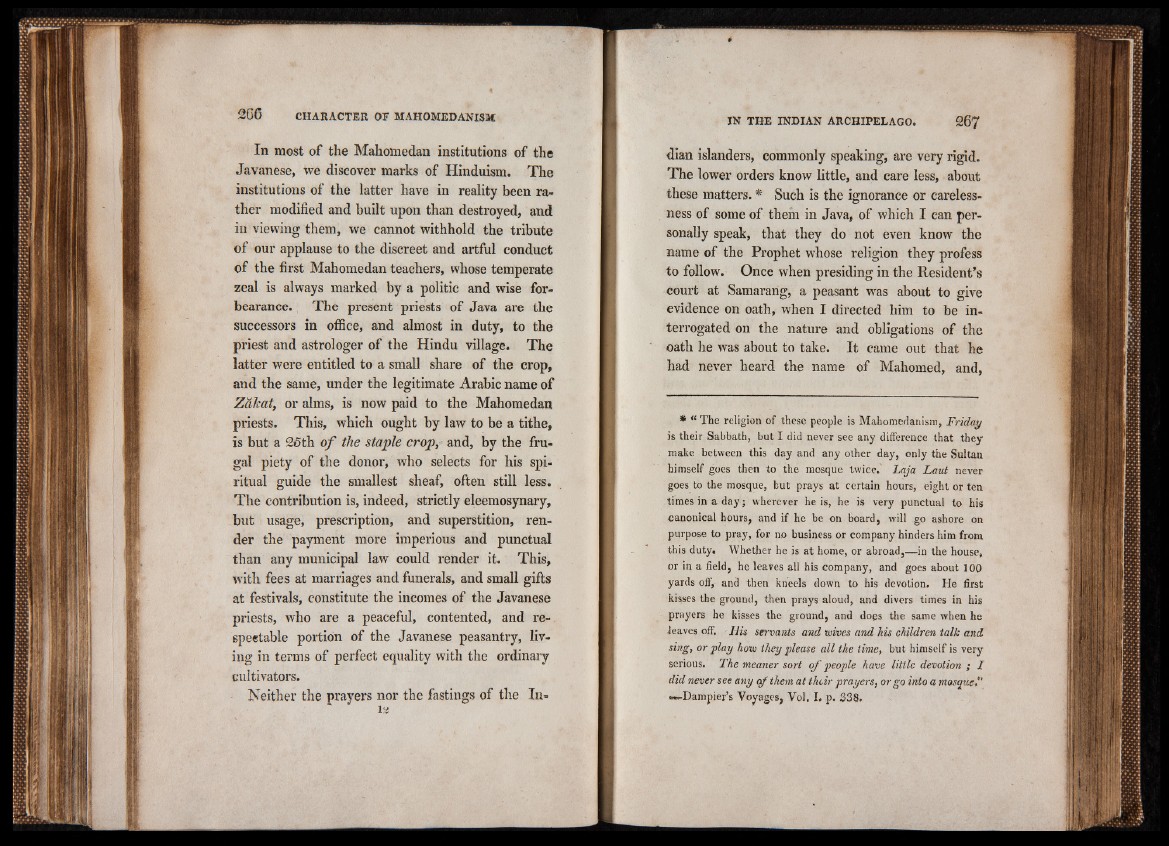
In most of the Mahomedan institutions of the
Javanese, we discover marks of Hinduism. The
institutions of the latter have in reality been rather
modified and built upon than destroyed, and
in viewing them, we cannot withhold the tribute
of our applause to the discreet and artful conduct
of the first Mahomedan teachers, whose temperate
zeal is always marked by a politic and wise forbearance.
The present priests of Java are the
successors in office, and almost in duty, to the
priest and astrologer of the Hindu village. The
latter were entitled to a small share of the crop,
and the same, under the legitimate Arabic name of
Z c ika ty or alms, is now paid to the Mahomedan
priests. This, which ought by law to be a tithe,
is but a 25th o f the staple crop, and, by the frugal
piety of the donor, who selects for his spiritual
guide the smallest sheaf, often still less.
The contribution is, indeed, strictly eleemosynary,
but usage, prescription, and superstition, render
the payment more imperious and punctual
than any municipal law could render it. This,
with fees at marriages and funerals, and small gifts
at festivals, constitute the incomes of the Javanese
priests, who are a peaceful, contented, and respectable
portion of the Javanese peasantry, living
in terms of perfect equality with the ordinary
cultivators.
Neither the prayers nor the is fastings of the Indian
islanders, commonly speaking, are very rigid.
The lower orders know little, and care less, about
these matters. * Such is the ignorance or carelessness
of some of them in Java, of which I can personally
speak, that they do not even know the
name of the Prophet whose religion they profess
to follow. Once when presiding in the Resident’s
court at Samararig, a peasant was about to give
evidence on oath, when I directed him to be interrogated
on the nature and obligations of the
oath he was about to take. It came out that he
had never heard the name of Mahomed, and,
* “ The religion of these people is Mahomedanism, Friday
is their Sabbath, but I did never see any difference that they
make between this day and any other day, only the Sultan
himself goes then to the mosque twice.' Laja Laut never
goes to the mosque, but prays at certain hours, eight or ten
times in a day; where ver he is, he is very punctual to his
canonical hours, and if he be on board, will go ashore on
purpose to pray, for no business or company hinders him from
this duty. Whether he is at home, or abroad,—in the house,
or in a field, he leaves all his company, and goes about 100
yards off,- and then kneels down to his devotion. He first
kisses the ground, then prays aloud, and divers times in his
prayers he kisses the ground, and dogs the same when he
leaves off. His servants and tvives and his children talk and
sing, or play hole they please all the time, but himself is very
serious. The meaner sort o f people have little devotion ; I
did never see any of them at their prayers, or go into a mosque,"
-wDampier’s Voyages, Vol. I. p. 333.